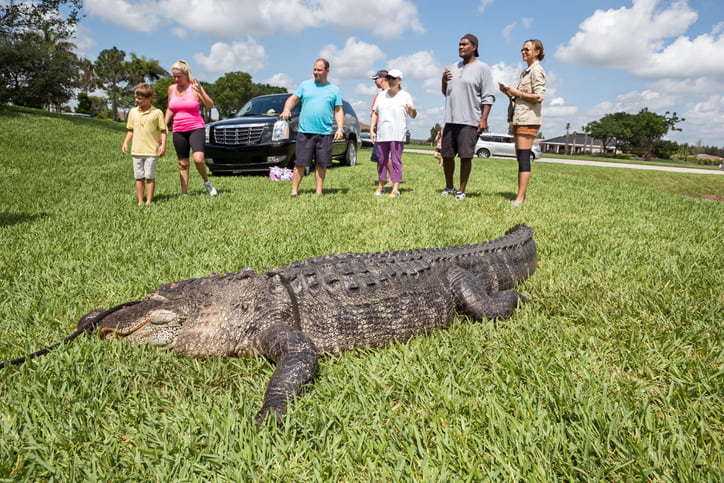Liability for Alligator Attacks

With millions of alligators living in the State of Florida, liability for alligator attacks is an important question. When an alligator attack occurs, the victim often suffers serious or fatal injuries.
The question of legal liability after an alligator attack can be complex. The legal issues raised after an attack may require the help of experienced Tampa personal injury lawyers to address. Here’s what you need to know about legal liability for alligator attacks in Florida.
Contact our team today to schedule a FREE consultation
Schedule a free consultation today to discuss your car accident injuries and see how our injury attorneys can help you get
Who Is Liable for an Alligator Attack in Florida?
The property owner or the victim may be legally liable for an alligator attack in Florida. Liability for an alligator attack depends on the actions of all of the parties involved and the events that lead to the injury. A private property owner is more likely to be liable for an alligator attack than a government entity.
How Do You Determine Legal Liability for an Alligator Attack in Florida?
You determine legal liability for an alligator attack in Florida by examining the factual circumstances, determining fault, and seeing how Florida law applies to the claim. Establishing responsibility for an alligator attack begins with what responsibility the property owner has to the victim. In the case of private property, the property owner has a very high duty to keep the property safe for victims.
A property owner may post warning signs about no swimming, but a sign may be legally inadequate. A private property owner has a very high duty to inspect the property and take measures to keep invited guests safe. If you enter the property as a paying customer, you have the right to the protection of the law in that the property owner should take active steps to look for dangers and prevent you from getting hurt.
When an alligator attack victim is on a property for a mutually beneficial purpose, there are still some legal requirements that a property owner take steps to protect the safety of visitors. However, the legal standards for a property owner who is not conducting business on the property are lower than they are for someone who is inviting paid customers onto the property. For example, a government entity that runs a local park with a swimming area does not have the same liability for an alligator attack that a private property owner may have.
Alligator Attacks and Legal Liability
Once you establish the legal standards that apply to the property owner, the question of legal liability for an alligator attack comes down to the facts of each case. The actions of the property owner are relevant; the actions of the victim are relevant, too. If the property owner posts warning signs, takes steps to section off the area from visitors, and otherwise does everything that they can to stop the victim from going near the alligators, the property owner may not have any legal liability. However, if the property owner doesn’t post warning signs or posts vague warning signs, the property owner may be liable.
Legal liability for an alligator attack comes down to the negligence and recklessness of each party. The law examines the actions of each party to determine who behaved in a way that resulted in the attack. It’s possible that both the property owner and the victim share legal liability for the alligator attack. While a property owner has a duty to protect their guests, a person on someone else’s property also has a duty to act reasonably and take steps to protect their own safety.
Florida law uses a system of comparative negligence to apportion fault among the parties. Even if the victim is partially to blame for the accident, they may still be able to recover something if the accident is also the fault of the property owner. An experienced Tampa injury attorney can help you determine how the law applies and what you may recover for your alligator attack.
Florida Alligator Attacks and Legal Liability
One case involving legal liability after a Florida alligator attack is Palumbo v. State Game and Fresh Water Fish Commission, 487 So.2d 352 (Fla 1st DCA 1986). In the case, a man saw a boat overturned in a lake. The man swam out to help, and an alligator attacked him. The man suffered injuries.
The court ruled that the government entity that owned the property posted sufficient warnings about alligators in the water. There were posted “No Swimming” and “Unlawful to Feed Alligators” signs posted on the property. The court ruled that the warning signs were clear enough that the man should have known the risks before swimming into the water. The court dismissed the case against the government entity.
If the attack had occurred on private property, the result might have been different. Each alligator attack case is very specific to the facts of the case. Your attorney can help you investigate all of the relevant facts and circumstances to determine if you have grounds to bring a claim for recovery after an alligator attack.
How to Bring a Lawsuit after an Alligator Attack

If you’re hurt because of an alligator attack, you bring a lawsuit by filing your claim in the appropriate court. You state the facts of how the alligator attack occurred, and you state that the other party acted negligently in a way that led to the attack. You report your damages for the attack, and you ask the court for relief in the form of payment for your damages.
Once you file the lawsuit, you formally serve a copy of the paperwork on the defendant. You await the defendant’s reply and further proceedings from the court. Because of the intricacies of alligator injury cases, it’s important to work diligently with your attorney to build the evidence in your case. Your attorney can also help you negotiate with the other side for a fair resolution to the claim.
Contact Our Tampa Injury Attorneys
Has an alligator attack hurt you or a loved one? You may have a right to compensation. At Jack Bernstein, Injury Attorneys, our leader, Jack Bernstein, personally oversees every case. With decades of experience and thousands of satisfied clients, we have the expertise, determination, and confidence to help you get the compensation that you deserve after an alligator attack. There’s no cost to call us. If we represent you, there’s no fee unless you win. Call us today to begin your case.
Contact our team today to schedule a FREE consultation
